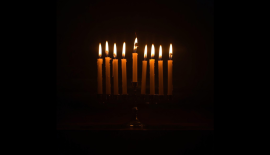Weekly Update: Our obsession with “saving Israel in spite of herself”
In a recent column in Jerusalem Post David M. Weinberg argues that the foreign policy elite installed by the new Biden Administration seems likely to revert to the Obama Administration policies of seeking rapprochement with Iran and the PLO, and putting pressure on Israel to make concessions.
This mindset was not unique to the Obama era, it is not limited to Washington, and it is also not limited to those on the political left or right. In Europe, it has been the dominant view for decades, as reflected in EU policy dictated by Brussels. It is a mindset that clashes with the realities of the Middle East. In fact, it comes not from a realistic analysis of what the conflict is all about, or what is required to solve it. Rather, it has something to do with our own “Western” need to impose our sense of right and wrong on a “morally fallen Israel”.
Referring to several recent essays, Weinberg argues that it stems from a deep-seated moral compulsion to “save Israel despite herself”. It is the fruit of centuries of Western Christian replacement theology, and it sits deeply in our Western psyche.
The festival of Purim, which will be celebrated next week, reminds us of the harsh reality that the existence of the Jewish people as a nation should never be taken for granted. The spirit of anti-Semitism is, sadly, still very much present in the Middle East.
The Editorial team
Israel & Christians Today
Saving morally fallen Israel
David M. Weinberg in JPost refers to important essays by Shany Mor and Michael Doran in Mosiac Magazine: ‘The peace-processing “guild” (which Trump’s team upended) “remains wedded to a fuzzy-headed and unchanging conventional wisdom, characterized by epistemic closure, that has proven remarkably resistant to sober-minded reappraisals” (such as the Trump peace plan). This guild sanctimoniously seeks to rescue a “morally fallen Israel” (a country compromised by its own hard-fought victories) by forcing a peace deal that will see Israelis in pain. Thus, Israeli withdrawals and “sacrifices” for peace are the only way to ritually purify Israel from its sins, and thereby expiate America of its responsibility for crimes against progressivism and against an “equitable” balance of power in the region.’ Read more..
Palestinians: What Real Education Means
Khaled Abu Toameh at Gatestone Institute: ‘Palestinian leaders need to tell their people that Israel has the right to exist. They need to tell their people that peace and normalization is good not only for Israel, but also for the Palestinians. They need to tell their people that cooperation with Israel is better than boycotts.’ Read more..
The International Criminal Court Threatens Middle East Peace
Richard Kemp at Gatestone Institute: ‘The ICC’s imperious judgement on its own authority over Israel is not only detrimental to peace, it also undermines the credibility of the court itself. Both are consequences so serious that responsible member states should consider at least temporarily defunding the ICC pending fundamental reform.’ Read more..
Pray for the Peace of Jerusalem
Rev. Willem J.J. Glashouwer explains why it is important for Christians to pray for the peace of Jerusalem.
The lessons of Purim
The Jewish people will celebrate Purim next week – commemorating the saving of the Jewish people from Haman, a Persian Empire official who was planning to kill all the Jews, as recounted in the Book of Esther.
In this webinar recently held by C4I Singapore, Rabbi Mordechai Abergel explains the significance of Purim.
When Mordecai learned of all that had been done, he tore his clothes, put on sackcloth and ashes, and went out into the city, wailing loudly and bitterly. 2 But he went only as far as the king’s gate, because no one clothed in sackcloth was allowed to enter it. 3 In every province to which the edict and order of the king came, there was great mourning among the Jews, with fasting, weeping and wailing. Many lay in sackcloth and ashes.
4 When Esther’s eunuchs and female attendants came and told her about Mordecai, she was in great distress. She sent clothes for him to put on instead of his sackcloth, but he would not accept them. 5 Then Esther summoned Hathak, one of the king’s eunuchs assigned to attend her, and ordered him to find out what was troubling Mordecai and why.
6 So Hathak went out to Mordecai in the open square of the city in front of the king’s gate. 7 Mordecai told him everything that had happened to him, including the exact amount of money Haman had promised to pay into the royal treasury for the destruction of the Jews. 8 He also gave him a copy of the text of the edict for their annihilation, which had been published in Susa, to show to Esther and explain it to her, and he told him to instruct her to go into the king’s presence to beg for mercy and plead with him for her people.
9 Hathak went back and reported to Esther what Mordecai had said. 10 Then she instructed him to say to Mordecai, 11 “All the king’s officials and the people of the royal provinces know that for any man or woman who approaches the king in the inner court without being summoned the king has but one law: that they be put to death unless the king extends the gold scepter to them and spares their lives. But thirty days have passed since I was called to go to the king.”
12 When Esther’s words were reported to Mordecai, 13 he sent back this answer: “Do not think that because you are in the king’s house you alone of all the Jews will escape. 14 For if you remain silent at this time, relief and deliverance for the Jews will arise from another place, but you and your father’s family will perish. And who knows but that you have come to your royal position for such a time as this?”
15 Then Esther sent this reply to Mordecai: 16 “Go, gather together all the Jews who are in Susa, and fast for me. Do not eat or drink for three days, night or day. I and my attendants will fast as you do. When this is done, I will go to the king, even though it is against the law. And if I perish, I perish.”
17 So Mordecai went away and carried out all of Esther’s instructions.




